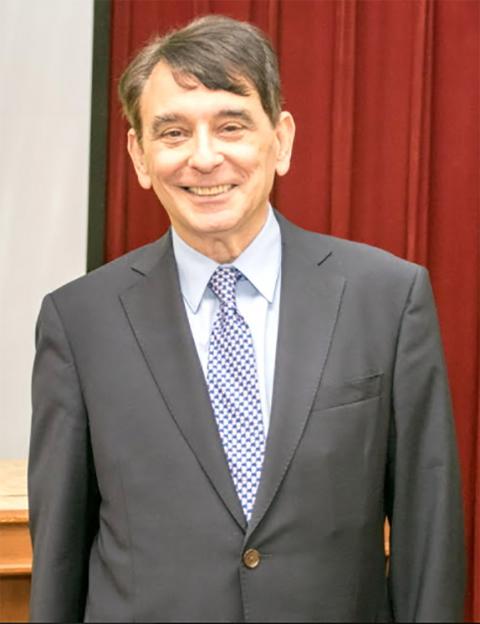The Taiwan Travel Act “atypically recognizes, albeit indirectly, that Taiwan is in fact a ‘country,’” former American Institute in Taiwan (AIT) director William Stanton wrote on Sunday.
“It is symbolically significant that [US] President [Donald] Trump has signed the Taiwan Travel Act rather than allowing it to go quietly into effect absent his positive endorsement,” wrote Stanton, a visiting professor at National Taiwan University’s International College.
Stanton described Trump’s signing on Friday of the Taiwan Travel Act as a “public signal of affirmation rather than private acquiescence.”

Photo courtesy of William Stanton
However, he also called Trump’s delay in signing the act “worrisome,” because he saw it as “another sign of the vacillation we have already witnessed in [Trump’s] policies toward China and Taiwan.”
Stanton said that during his time as AIT director, he “strongly and often advocated what the Taiwan Travel Act now calls for — expanded high-level visits and contacts” between Taiwan and the US.
“All of the restrictions on the conduct of [the US’] ‘non-
diplomatic’ relations with Taiwan were only the self-imposed interpretative creations of US government lawyers,” he wrote.
“There was no reason why we could not simply change them,” he said, adding that with “quiet support” from Washington, he raised the US flag over the AIT for the first time since 1979, when the US broke formal diplomatic ties with Taiwan.
“The Taiwan Travel Act is significant, not only because of the higher level treatment of Taiwan it calls for, but also for its ‘findings,’” Stanton wrote.
These findings include “recognition of Taiwan’s ‘momentous transition to democracy,’” and that Taiwan “serves as a ‘beacon of democracy in Asia,’” he said.
Stanton also highlighted the fifth finding stated by the US Congress in the Taiwan Travel Act: “Visits to a country by United States Cabinet members and other high-ranking officials are an indicator of the breadth and depth of ties between the United States and such country.”
He said he hopes Taiwan will take advantage of this “endorsement of higher-level contacts.”
He said he welcomes the “recent shift in direction of the Trump Administration in dealing with China, and the elevation of advisors in the White House who are more willing to challenge the traditional Kissingerian view that the apparent stability of the overall US bilateral relationship with China always supersedes all individual Chinese policies no matter how harmful they are to US interests.”
The Taiwan Travel Act is “an important milestone in the maturation of US policy toward Taiwan and China,” he added.
The next logical step for the US administration “should be abolishing the AIT Washington office,” he said.
The office “long ago ceased to have any real role in Taiwan’s relations with the United States which require no intermediaries,” he added.

SEPARATE: The MAC rebutted Beijing’s claim that Taiwan is China’s province, asserting that UN Resolution 2758 neither mentions Taiwan nor grants the PRC authority over it The “status quo” of democratic Taiwan and autocratic China not belonging to each other has long been recognized by the international community, the Mainland Affairs Council (MAC) said yesterday in its rebuttal of Beijing’s claim that Taiwan can only be represented in the UN as “Taiwan, Province of China.” Chinese Minister of Foreign Affairs Wang Yi (王毅) yesterday at a news conference of the third session at the 14th National People’s Congress said that Taiwan can only be referred to as “Taiwan, Province of China” at the UN. Taiwan is an inseparable part of Chinese territory, which is not only history but

NATIONAL SECURITY: The Chinese influencer shared multiple videos on social media in which she claimed Taiwan is a part of China and supported its annexation Freedom of speech does not allow comments by Chinese residents in Taiwan that compromise national security or social stability, the nation’s top officials said yesterday, after the National Immigration Agency (NIA) revoked the residency permit of a Chinese influencer who published videos advocating China annexing Taiwan by force. Taiwan welcomes all foreigners to settle here and make families so long as they “love the land and people of Taiwan,” Premier Cho Jung-tai (卓榮泰) told lawmakers during a plenary session at the Legislative Yuan in Taipei. The public power of the government must be asserted when necessary and the Ministry of

CROSSED A LINE: While entertainers working in China have made pro-China statements before, this time it seriously affected the nation’s security and interests, a source said The Mainland Affairs Council (MAC) late on Saturday night condemned the comments of Taiwanese entertainers who reposted Chinese statements denigrating Taiwan’s sovereignty. The nation’s cross-strait affairs authority issued the statement after several Taiwanese entertainers, including Patty Hou (侯佩岑), Ouyang Nana (歐陽娜娜) and Michelle Chen (陳妍希), on Friday and Saturday shared on their respective Sina Weibo (微博) accounts a post by state broadcaster China Central Television. The post showed an image of a map of Taiwan along with the five stars of the Chinese flag, and the message: “Taiwan is never a country. It never was and never will be.” The post followed remarks

Proposed amendments would forbid the use of all personal electronic devices during school hours in high schools and below, starting from the next school year in August, the Ministry of Education said on Monday. The Regulations on the Use of Mobile Devices at Educational Facilities up to High Schools (高級中等以下學校校園行動載具使用原則) state that mobile devices — defined as mobile phones, laptops, tablets, smartwatches or other wearables — should be turned off at school. The changes would stipulate that use of such devices during class is forbidden, and the devices should be handed to a teacher or the school for safekeeping. The amendments also say